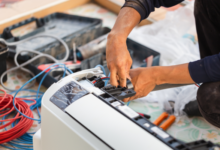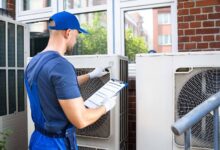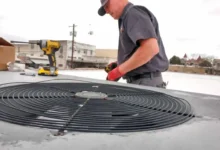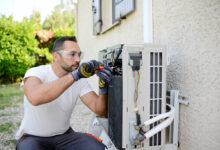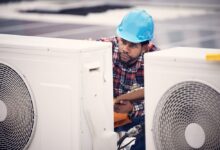HVAC Repair Tucson: Finding the Right HVAC Repair Service
HVAC Repair Tucson – Welcome to our ultimate guide on HVAC repair in Tucson! In this comprehensive article, we will delve into the world of heating, ventilation, and air conditioning systems, providing you with valuable insights on how to keep your HVAC system in top-notch condition. Whether you are a homeowner or a business owner, understanding the ins and outs of HVAC maintenance and repair is crucial for ensuring optimal performance, energy efficiency, and cost savings.
Over time, your HVAC system may experience wear and tear, leading to reduced efficiency, higher energy bills, and even complete breakdowns. However, with proper care and regular maintenance, you can extend the lifespan of your system and avoid costly repairs. In this comprehensive guide, we will cover everything you need to know about HVAC repair in Tucson, from common issues and troubleshooting tips to finding the best HVAC repair service in the area.
The Importance of Regular HVAC Maintenance
Regular HVAC maintenance is essential for keeping your system running smoothly and efficiently. It not only prolongs the lifespan of your equipment but also helps prevent costly breakdowns and ensures optimal performance. In this section, we will discuss the importance of regular maintenance and provide you with a step-by-step guide on how to perform basic maintenance tasks yourself.
The Benefits of Regular Maintenance
Regular HVAC maintenance offers several benefits for both homeowners and businesses. Firstly, it improves energy efficiency, resulting in lower utility bills. Properly maintained systems require less energy to operate, reducing your environmental impact and saving you money. Secondly, regular maintenance helps maintain optimal indoor air quality. Dust, allergens, and pollutants can accumulate in your HVAC system over time, leading to poor air quality. Cleaning and replacing filters regularly can significantly improve the air you breathe. Lastly, regular maintenance can extend the lifespan of your HVAC equipment. By identifying and addressing minor issues early on, you can prevent major breakdowns and costly repairs.
Performing Basic HVAC Maintenance
While some maintenance tasks require professional expertise, there are several things you can do yourself to keep your HVAC system in good shape. Start by regularly changing or cleaning your air filters. Clogged filters restrict airflow, reducing system efficiency and increasing energy consumption. Check your filters every month and replace them if they are dirty. Additionally, make sure your outdoor condenser unit is free from debris, such as leaves and twigs. Trim any vegetation around the unit to maintain proper airflow. Lastly, consider scheduling an annual professional HVAC inspection and tune-up. A trained technician can thoroughly clean and inspect your system, identify any potential issues, and ensure optimal performance.
Common HVAC Issues and Troubleshooting Tips
Even with regular maintenance, HVAC systems can still encounter problems. Understanding common issues and troubleshooting tips can help you identify and address minor problems before they escalate. In this section, we will explore some of the most common HVAC issues homeowners face and provide you with practical troubleshooting advice.
Poor Airflow
If you notice weak airflow from your vents, there could be several possible causes. Start by checking your air filters. Clogged filters can restrict airflow, so clean or replace them if necessary. Another potential cause is a blocked or leaky duct system. Inspect your ducts for any obstructions or leaks and seal them properly. Additionally, check if your registers and vents are open and unobstructed. Finally, ensure that your HVAC system’s blower motor is functioning correctly. If none of these troubleshooting steps solve the issue, it may be time to call a professional HVAC technician.
Strange Odors
If your HVAC system emits strange odors, it can be quite unpleasant and may indicate underlying issues. A musty odor, for example, could be a sign of mold growth within your system or ductwork. In this case, professional cleaning and mold remediation may be necessary. If you detect a burning smell, it could be due to an overheating motor or electrical component. Turn off your system immediately and contact an HVAC professional. They will be able to diagnose the problem and ensure your safety.
Uneven Cooling or Heating
If certain areas of your home are consistently cooler or warmer than others, you may be experiencing uneven cooling or heating. Several factors can contribute to this issue. Check if your air vents are open and unobstructed. Blocked vents can disrupt airflow and cause temperature imbalances. Additionally, ensure that your thermostat is functioning correctly and set to the desired temperature. If these steps don’t solve the problem, you may have an issue with your HVAC system’s zoning or ductwork. Consult with an HVAC technician to diagnose and address the issue.
Signs Your HVAC System Needs Repair
Recognizing the signs that your HVAC system needs repair is crucial for preventing major breakdowns and costly repairs. In this section, we will discuss the telltale signs that your system may be in trouble and guide you on when it’s time to call a professional HVAC technician.
Unusual Noises
If your HVAC system suddenly starts making strange noises, it’s a clear indication that something is amiss. Banging, rattling, or grinding noises can indicate loose or damaged components. Hissing or whistling sounds may suggest a refrigerant leak or issues with your ductwork. If you hear any of these noises, it’s best to turn off your system and contact an HVAC professional. They will be able to diagnose the problem and recommend the necessary repairs.
Frequent Cycling
If your HVAC system frequently turns on and off, it could be a sign of an underlying issue. Short cycling can occur due to a malfunctioning thermostat, clogged air filters, or improper system sizing. These issues not only put unnecessary stress on your equipment but also lead to energy wastage and increased utility bills. If you notice frequent cycling, it’s advisable to have a professional HVAC technician inspect your system and identify the root cause.
Inconsistent Temperatures
Experiencing inconsistent temperatures throughout your home can be frustrating. If certain areas are too hot or too cold compared to the thermostat setting, there may be an issue with your HVAC system. Possible causes include a faulty thermostat, imbalanced airflow, or ductwork problems. A professional HVAC technician can assess your system, identify the source of the problem, and recommend the appropriate repairs or adjustments.
DIY HVAC Repair: What You Can Do and What to Leave to the Pros
While some HVAC repairs are simple enough to handle on your own, others require professional expertise. In this section, we will outline the DIY HVAC repairs you can tackle yourself and explain when it’s best to leave the repairs to licensed HVAC technicians.
Replacing Air Filters
One of the most important maintenance tasks you can do yourself is replacing air filters. Dirty filters restrict airflow, reduce system efficiency, and negatively impact indoor air quality. Check your filters every month and replace them as needed. Most HVAC systems use standard filters that are easily accessible and can be replaced without professional help.
Cleaning Vents and Registers
Another DIY task you can perform is cleaning your vents and registers. Over time, dust, pet dander, and other debris can accumulate, reducing airflow and affecting system performance. Use a vacuum cleaner or a soft brush to remove any visible dirt. For a more thorough cleaning, you can also remove the vent covers and wash them with warm soapy water. Ensure that they are completely dry before reinstalling them.
Sealing Air Leaks
Identifying and sealing air leaks in your ductwork can significantly improve the efficiency of your HVAC system. Inspect your ducts for any visible gaps or loose connections. Use duct sealant or metal tape to seal the leaks effectively. However, if you have extensive ductwork issues or are unsure about the process, it’s best to consult with a professional HVAC technician. They have the expertise and equipment to identify and seal air leaks more effectively.
When to Call a Professional
While DIY maintenance can go a long way in keeping your system in good shape, certain repairs and complex issues are best left to licensed HVAC technicians. Attempting to fix advanced electrical or mechanical problems without proper knowledge and training can be dangerous and may cause further damage. It’s always advisable to contact a professional if you encounter issues like refrigerant leaks, motor failures, or electrical malfunctions. They have the expertise and experience to diagnose and repair these problems safely and efficiently.
Finding the Right HVAC Repair Service in Tucson
When it comes to HVAC repair, finding a reliable and trustworthy service provider is crucial. In this section, we will offer tips on how to choose the best HVAC repair service in Tucson. We will discuss factors to consider, such as certifications, experience, and customer reviews, to ensure you hire a reputable company that will get the job done right.
Certifications and Licenses
When selecting an HVAC repair service, it’s important to verify that they hold the necessary certifications and licenses. Look for technicians who are certified by reputable organizations such as NATE (North American Technician Excellence) or ACCA (Air Conditioning Contractors of America). These certifications ensure that the technicians have undergone rigorous training and have the necessary knowledge to handle HVAC repairs effectively.
Experience and Expertise
Experience is another crucial factor to consider when choosing an HVAC repair service. Look for companies that have been in business for several years and have a proven trackrecord of providing quality service. An experienced HVAC repair service will have encountered a wide range of issues and will be equipped to handle any problem that arises with your system. Additionally, consider the expertise of the technicians. Do they specialize in residential or commercial HVAC systems? Choosing a service provider that aligns with your specific needs ensures that they have the necessary knowledge and skills to address your HVAC repair requirements.
Reputation and Customer Reviews
Checking the reputation of an HVAC repair service is essential before making a decision. Look for online reviews and testimonials from previous customers to get an idea of their satisfaction levels. Positive reviews and high ratings indicate that the company is reliable, trustworthy, and provides excellent customer service. Don’t hesitate to ask for references from the HVAC repair service to speak directly with their past clients and gather more information about their experiences.
24/7 Emergency Service
Emergencies can happen at any time, and having access to HVAC repair services when you need them most is crucial. Look for companies that offer 24/7 emergency service, ensuring that they will be available to assist you, even during weekends or holidays. Knowing that you can rely on prompt and efficient service in case of a sudden breakdown provides peace of mind and minimizes the inconvenience of being without heating or cooling.
Transparent Pricing and Warranty
When choosing an HVAC repair service, it’s important to consider their pricing structure and whether they offer any warranties or guarantees. Look for a company that provides upfront and transparent pricing, with no hidden fees or surprises. A reputable service provider will offer a detailed estimate and explain the breakdown of costs before starting any repairs. Additionally, inquire about any warranties or guarantees they provide on their workmanship and replacement parts. A warranty ensures that you are protected in case of any issues that arise after the repair or replacement.
Cost of HVAC Repair in Tucson
Understanding the cost of HVAC repair is essential for budgeting and making informed decisions. In this section, we will provide an overview of typical HVAC repair costs in Tucson. We will also discuss factors that can influence the overall cost, such as the type of repair needed, the age of your system, and any required replacement parts.
Typical HVAC Repair Costs
The cost of HVAC repair can vary depending on the complexity of the issue and the specific components that need to be repaired or replaced. On average, homeowners in Tucson can expect to pay between $150 and $500 for HVAC repairs. However, it’s important to note that this is just a general range, and the actual cost can be higher or lower depending on various factors.
Factors Influencing HVAC Repair Costs
Several factors can influence the cost of HVAC repairs. Firstly, the type of repair needed plays a significant role. Minor issues such as replacing a faulty thermostat or a capacitor will typically cost less than repairing a major component like a compressor or a blower motor. Additionally, the age of your HVAC system can affect the cost. Older systems may require more extensive repairs or replacement parts that are no longer readily available, increasing the overall cost.
The availability and cost of replacement parts can also impact repair costs. Some components may need to be sourced from specific manufacturers or suppliers, leading to higher prices. Furthermore, the need for additional repairs or maintenance during the HVAC repair process can also increase the overall cost. For example, if an HVAC technician discovers a refrigerant leak while repairing another component, the repair cost will include fixing the leak and recharging the system with refrigerant.
Tips for Preventing Future HVAC Issues
Prevention is always better than cure, especially when it comes to HVAC systems. In this section, we will share valuable tips for preventing future HVAC issues. From regular maintenance schedules to simple habits that can prolong the lifespan of your system, we will equip you with the knowledge and tools to keep your HVAC system running smoothly for years to come.
Establish a Regular Maintenance Schedule
One of the most effective ways to prevent future HVAC issues is by establishing a regular maintenance schedule. Schedule professional HVAC inspections and tune-ups at least once a year. During these visits, a trained technician will thoroughly clean and inspect your system, identify potential issues, and make necessary adjustments. Regular maintenance helps catch minor problems before they escalate and ensures that your system operates at peak performance.
Change or Clean Air Filters Regularly
Air filters play a crucial role in maintaining optimal system performance and indoor air quality. Clogged filters restrict airflow, reducing efficiency and increasing energy consumption. Make it a habit to check your air filters every month and replace them if they are dirty. If you have reusable filters, clean them according to the manufacturer’s instructions. Regularly changing or cleaning your filters ensures proper airflow and helps prevent issues caused by dust and debris accumulation.
Keep Outdoor Units Clean and Clear
Your outdoor condenser unit is exposed to the elements, making it susceptible to dirt, leaves, and other debris. Regularly clean the area around your outdoor unit and remove any obstructions. Trim vegetation to maintain at least two feet of clearance around the unit. Ensuring that your outdoor unit is clean and unobstructed allows for proper airflow and prevents issues caused by debris buildup.
Monitor and Adjust Thermostat Settings
Monitoring and adjusting your thermostat settings can significantly impact energy efficiency and system performance. Use programmable thermostats to set temperature schedules based on your occupancy patterns. This allows you to reduce energy consumption when no one is home or during sleeping hours. Additionally, consider adjusting your thermostat settings by a few degrees to reduce the strain on your system during extreme weather conditions. Small adjustments can make a significant difference in energy savings and system longevity.
Promote Good Indoor Air Quality
Indoor air quality has a direct impact on your health and the performance of your HVAC system. To promote good indoor air quality, avoid smoking indoors and minimize the use of harsh chemicals that can release harmful fumes. Regularly clean your home or office space to reduce dust and allergens. Consider using air purifiers or installing ventilation systems that help remove pollutants and ensure fresh air circulation. Good indoor air quality not only benefits your health but also helps maintain the cleanliness of your HVAC system.
Energy Efficiency and HVAC Systems
Increasing energy efficiency is not only beneficial for the environment but also for your wallet. In this section, we will explore how HVAC systems impact your energy consumption and provide tips on how to improve energy efficiency. From programmable thermostats to insulation upgrades, we will help you reduce your carbon footprint while saving money on utility bills.
The Impact of HVAC Systems on Energy Consumption
HVAC systems are major contributors to energy consumption in residential and commercial buildings. Heating and cooling can account for a significant portion of your energy bills, especially during extreme weather conditions. Inefficient HVAC systems or improper usage can lead to unnecessary energy wastage and increased costs. Understanding how your HVAC system impacts energy consumption is the first step to improving energy efficiency.
Use Programmable Thermostats
One of the simplest and most effective ways to improve energy efficiency is by using programmable thermostats. These devices allow you to set temperature schedules based on your daily routines. By automatically adjusting the temperature when you are away or asleep, programmable thermostats help reduce energy consumption without sacrificing comfort. Consider upgrading to a smart thermostat that can learn your preferences and make adjustments automatically.
Seal and Insulate Your Home or Building
Proper insulation and sealing of your home or building can significantly improve energy efficiency. Insulate your walls, attic, and crawl spaces to minimize heat transfer and maintain a consistent indoor temperature. Additionally, seal any air leaks in your windows, doors, and ductwork to prevent drafts and ensure that conditioned air stays inside. Good insulation and sealing help reduce the workload on your HVAC system, leading to energy savings.
Regularly Maintain and Clean Your System
Regular maintenance and cleaning of your HVAC system can greatly impact its energy efficiency. Dirty coils, clogged filters, and blocked vents can restrict airflow and force your system to work harder. Schedule professional maintenance visits to clean and tune-up your system at least once a year. Additionally, clean or replace your air filters regularly to ensure proper airflow. Properly maintained systems operate more efficiently, resulting in lower energy consumption.
The Role of HVAC Maintenance Contracts
HVAC maintenance contracts can offer peace of mind and additional benefits for homeowners and businesses. In this section, we will discuss the advantages of HVAC maintenance contracts, including priority service, discounted repairs, and regular check-ups. We will also provide guidance on what to look for when considering a maintenance contract.
Advantages of HVAC Maintenance Contracts
HVAC maintenance contracts provide several advantages, making them worthwhile investments for many homeowners and businesses. Firstly, maintenance contracts often include priority service. In case of an HVAC emergency, contract holders receive priority scheduling, ensuring that their systems are repaired promptly. This can be particularly beneficial during extreme weather conditions when HVAC systems are under heavy demand.
Another advantage of maintenance contracts is discounted repairs. Contract holders often receive discounts on repairs or replacement parts, helping to reduce overall maintenance costs. Additionally, regular check-ups and tune-ups are typically included in maintenance contracts. Scheduled visits from trained technicians allow for early identification and resolution of potential issues, preventing major breakdowns and costly repairs.
Considerations for Choosing a Maintenance Contract
When consideringa maintenance contract, there are a few factors to keep in mind. Firstly, review the contract terms and ensure that they align with your specific needs. Some contracts may cover only basic maintenance tasks, while others offer more comprehensive coverage. Determine what level of service you require and choose a contract accordingly.
Secondly, consider the reputation and track record of the HVAC company offering the maintenance contract. Look for a company with a proven history of providing reliable service and customer satisfaction. Check online reviews and ask for references to gather more information about their performance and professionalism.
Lastly, evaluate the cost-effectiveness of the maintenance contract. Compare the cost of the contract to the potential savings on repairs and energy consumption. Consider the level of peace of mind and convenience the contract provides and weigh it against the financial investment. It’s important to find a balance between cost and the benefits offered by the contract.
The Future of HVAC Technology
The HVAC industry is constantly evolving, with new technologies and innovations emerging. In this final section, we will explore the future of HVAC technology, from smart HVAC systems to energy-efficient advancements. We will discuss how these developments can improve comfort, convenience, and sustainability, giving you a glimpse into what lies ahead for the HVAC industry.
Smart HVAC Systems
Smart HVAC systems are becoming increasingly popular due to their ability to enhance comfort and energy efficiency. These systems utilize advanced sensors and algorithms to automatically adjust temperature settings based on occupancy patterns and external conditions. Smart thermostats allow you to control and monitor your HVAC system remotely through smartphone apps, providing convenience and flexibility. With smart HVAC systems, you can optimize energy usage, reduce costs, and create customized comfort settings for different areas of your home or building.
Energy-Efficient Innovations
The HVAC industry is continuously working on developing energy-efficient innovations to reduce environmental impact and lower energy consumption. Advancements in compressor technology, such as variable speed compressors, allow HVAC systems to operate at different capacities based on demand, resulting in significant energy savings. Additionally, improvements in insulation materials and building envelope design contribute to reduced heat loss or gain, minimizing the workload on HVAC systems.
Indoor Air Quality Enhancements
As awareness of indoor air quality increases, the HVAC industry is focusing on developing technologies to enhance air purification and filtration. Advanced air filters and purification systems can effectively remove pollutants, allergens, and even viruses from the air, ensuring cleaner and healthier indoor environments. Ventilation systems with heat recovery capabilities are also gaining popularity as they facilitate fresh air exchange while minimizing energy loss.
Renewable Energy Integration
The integration of renewable energy sources, such as solar power, with HVAC systems is a growing trend. Solar-powered HVAC systems utilize solar panels to generate electricity, reducing reliance on the grid and lowering energy costs. These systems can also be designed to store excess energy for use during peak demand periods or in case of power outages. As renewable energy technology continues to advance, we can expect to see more widespread adoption of renewable energy-integrated HVAC systems.
Smart Grid Integration
Integration with smart grids is another area of development in the HVAC industry. Smart grids enable communication between utility providers and HVAC systems, allowing for optimized energy consumption based on real-time pricing and demand. By integrating with smart grids, HVAC systems can automatically adjust their operation to take advantage of off-peak electricity rates, further reducing energy costs and supporting grid stability.
As the HVAC industry continues to embrace technological advancements, the future holds promising possibilities for improved comfort, energy efficiency, and sustainability. By staying informed about the latest developments, you can make informed decisions when upgrading or maintaining your HVAC system, ensuring that you benefit from the latest innovations in the field.
In conclusion, maintaining your HVAC system in Tucson is essential for optimal performance, energy efficiency, and cost savings. By understanding the importance of regular maintenance, recognizing signs of trouble, and knowing when to seek professional help, you can ensure your HVAC system operates smoothly throughout the year.
Remember, DIY maintenance can go a long way in keeping your system in good shape, but certain repairs and complex issues require the expertise of licensed HVAC technicians. By finding the right HVAC repair service in Tucson and establishing a preventive maintenance routine, you can enjoy a comfortable, healthy, and energy-efficient indoor environment for years to come.
Embrace the future of HVAC technology and explore options for increasing energy efficiency. With proper care and attention, your HVAC system will continue to serve you well, providing optimal comfort and peace of mind.
